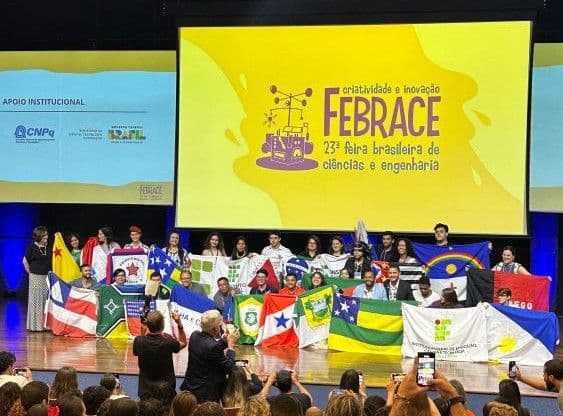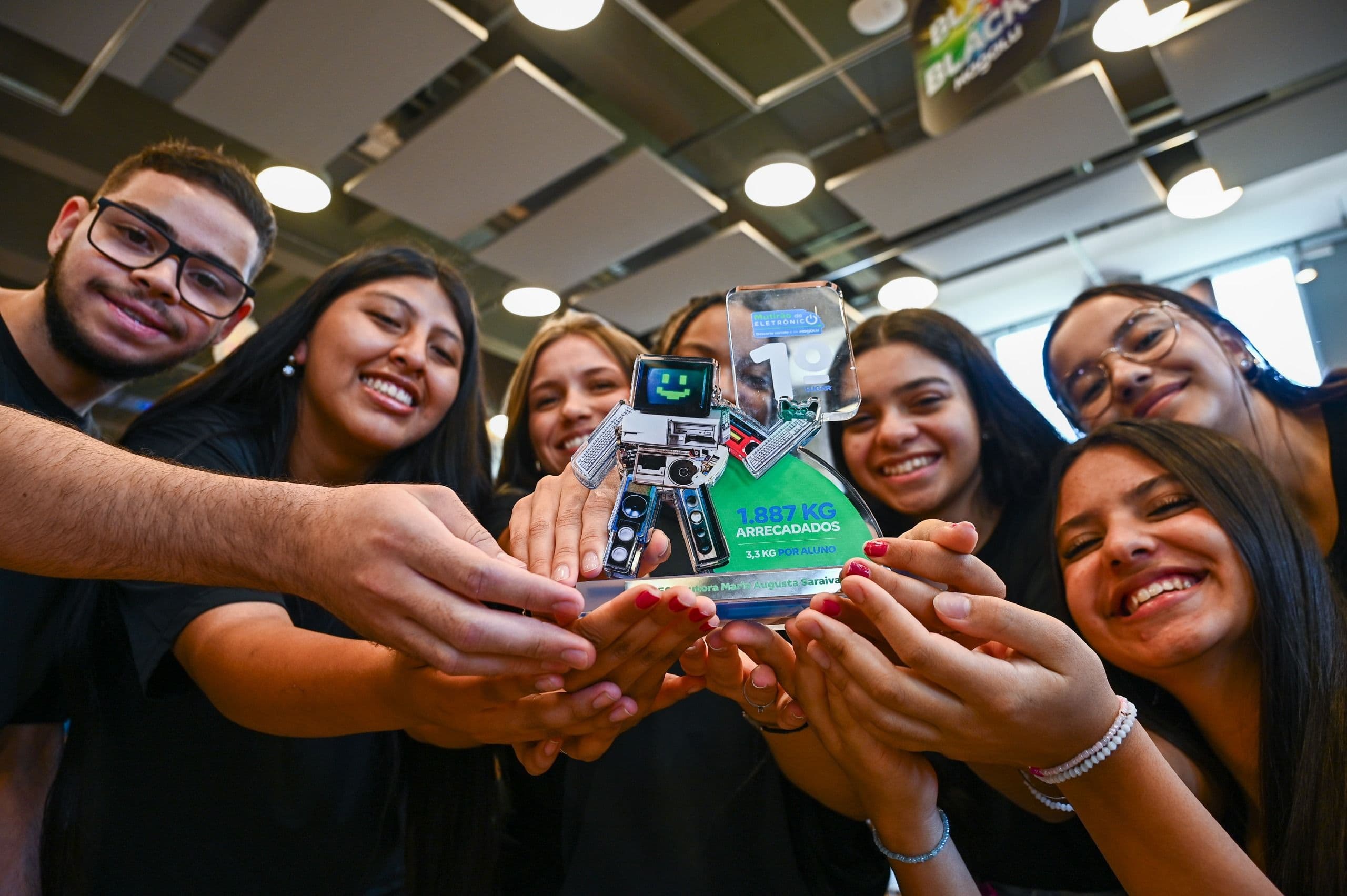
02/04/2025
International Award for a World Without Waste announces the winners of Febrace 2025
By Arlene Carvalho, from Movimento Circular
The 5th edition of the International Award for a World Without Waste, promoted by Movimento Circular, officially began during the 23rd Brazilian Science and Engineering Fair (Febrace), held last week in São Paulo. Five projects that address innovation in science and technology for the Circular Economy were selected among the champions and honorable mentions.
The award is an educational initiative of Movimento Circular, supported by our pioneering partner Dow, and in collaboration with major Science and Technology fairs across Latin America. Its goal is to identify, recognize, and give visibility to initiatives by students and educators that contribute to building a world without waste and more circular societies.
Meet the winners
1st Place – Ecoplasf: using improperly discarded waste to improve asphalt pavements – phase II
Students from SESI Boqueirão School in Curitiba (PR), Laura de Paula Rosa, Maria Cecília Wunder de Oliveira, Vitória Simão Vernizi, and their advisor Amanda de Souza Maloste won first place, reinforcing the importance of acting for the Circular Economy in everyday life.
The project proposes an innovative solution to two major environmental and urban challenges: improper waste disposal and the deterioration of public roads.
"We use waste that has a long decomposition time, as well as coconut fiber and glass, for example, to create a solution that addresses the improper disposal of petroleum derivatives and improves the quality of asphalt in our city," explained the students.
Tests conducted indicate that the proposal can be efficiently applied in society, reducing environmental impacts and improving urban infrastructure.
2nd Place – Sustainware: a sustainable alternative for ceramic tableware production
"I would like to imagine a world where the waste we discard is not a problem; where the millions of tons we dispose of are not mismanaged but are used in useful products like the ceramic tableware I presented here at Febrace," said Victoria Zimmer Gomes, a student at the Feliz Campus of the Federal Institute of Rio Grande do Sul (IFRS). She developed the Sustainware project under the guidance of Cínthia Gabriely Zimmer and co-guidance of Suyanne Angie Lunelli Bachmann, presenting an innovative solution for the ceramics industry with a focus on sustainability.
The research uses two abundant waste materials in the region with low recycling rates – rice husk and glass – to produce ceramic tableware with less environmental impact. By incorporating up to 60% of these residues (30% rice husk ash and 30% glass), the project not only reduces the consumption of mineral resources and energy but also lowers carbon emissions during the manufacturing process.
The results? The sustainable tableware performs equivalently to conventional ones, offering an eco-friendly and efficient alternative for ceramic production.
3rd Place - Coffee 3D Maker: innovating the present and saving the future
The Coffee 3D Maker project was developed by Julia Righette Soares, Mateus Valeriano Lopes, and Matheus de Abreu Mioto, students from Dom Daniel Comboni State High School in Nova Venécia, Espírito Santo. Under the guidance of Fabrício de Sá Hora Santos and co-guidance of João Vitor Santana dos Santos, they proposed an innovative and sustainable solution for 3D printing.
Using coffee waste, an abundant material in the region, the project demonstrates that it is possible to replace conventional plastic with a biodegradable and environmentally friendly material. In addition to reducing plastic use, it offers an alternative to improper waste disposal, a critical issue in Nova Venécia, where burning trash is common due to the lack of an efficient waste collection system.
The project addresses two major environmental challenges: plastic waste and the impact of coffee waste, which can clog pipes and contaminate rivers. By creating this sustainable material, the initiative not only contributes to environmental preservation but also generates new economic opportunities, stimulating the local economy.
Honorable Mentions
Ecoblister: reducing environmental impact through sustainable disposal of medication blister packs
The Ecoblister project is a game that aims to educate people about the proper disposal of medication blister packs, those rigid packages that protect and store medications. They contain materials like plastic and aluminum that are difficult to decompose and may have residual chemicals.
Developed by student Ana Elisa Vieira Forte, under the guidance of Marcelo Oliveira Ribeiro from Major João Antônio Marques School in Xangri-lá, Rio Grande do Sul, the project seeks to provide an educational solution to raise awareness in the school community about the proper disposal of these materials. The proposal benefits both the environment and the local community.
Palmlac: integrating Circular Economy and food security through the sustainable use of whey to combat malnutrition
PalmLac is an innovative solution that integrates Circular Economy and food security, focusing on combating malnutrition in Brazil’s semi-arid region. The project comes from Dom Juvêncio de Britto State School in Sergipe and is authored by Eloise de Souza Santos, Laura Fernanda Bras de Lima, and Maria Luiza Gomes dos Santos, under the guidance of Lark Soany Santos and co-guidance of Marisa Gomes Nobre.
It uses whey, rapadura (a type of unrefined sugar), and palm pulp to create a nutritious and accessible dairy drink, especially aimed at school-age children with severe nutritional deficiencies. With the potential to integrate into public programs such as PNAE (National School Feeding Program), the project seeks to generate positive impacts on child health and the regional economy.
The awarded projects show how creativity, science, and innovation can work together to transform environmental challenges into resilient solutions. By integrating the principles of the Circular Economy, these initiatives not only reduce negative environmental impacts but also generate social and economic benefits for their communities. With each new idea and practical application, we take another step toward a truly circular world.
Discover more
In the same subject:

Magalu’s Electronic Drive sends 87 tons of waste for recycling in São Paulo
Carried out in partnership with Circular Movement, the Magalu initiative combined teacher training, community mobilization and reverse logistics to expand the proper disposal of electronics.
